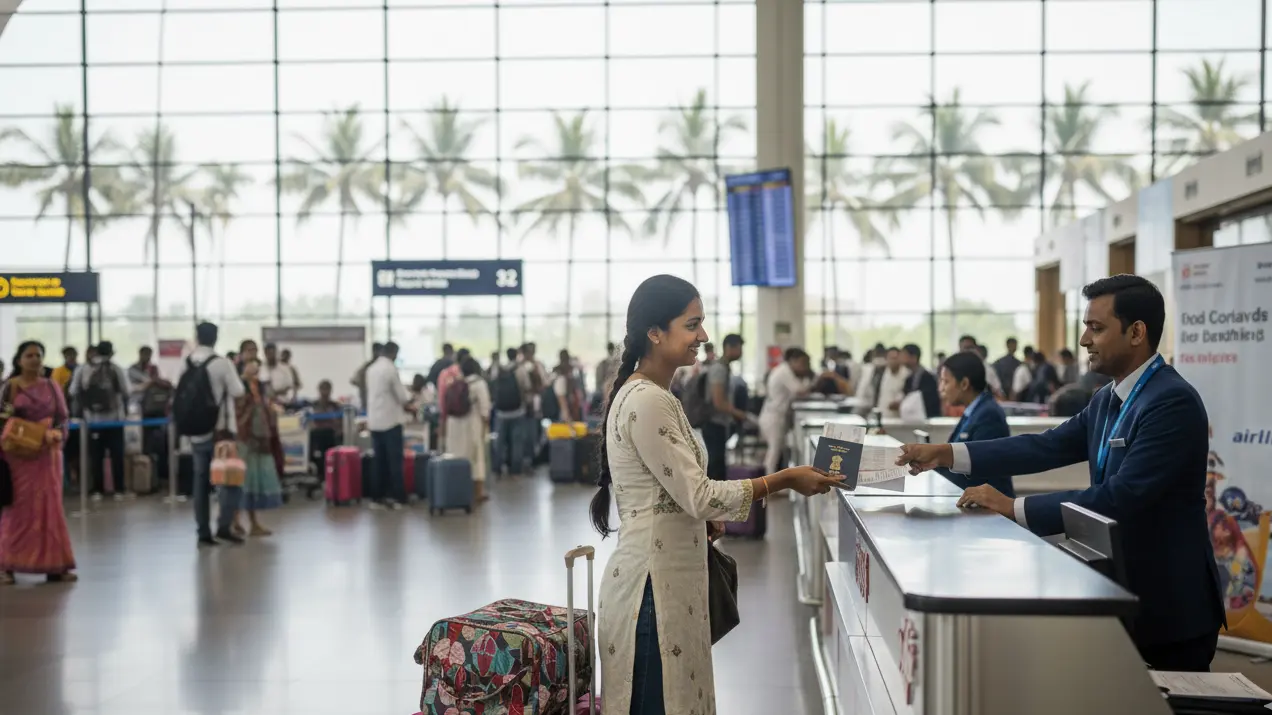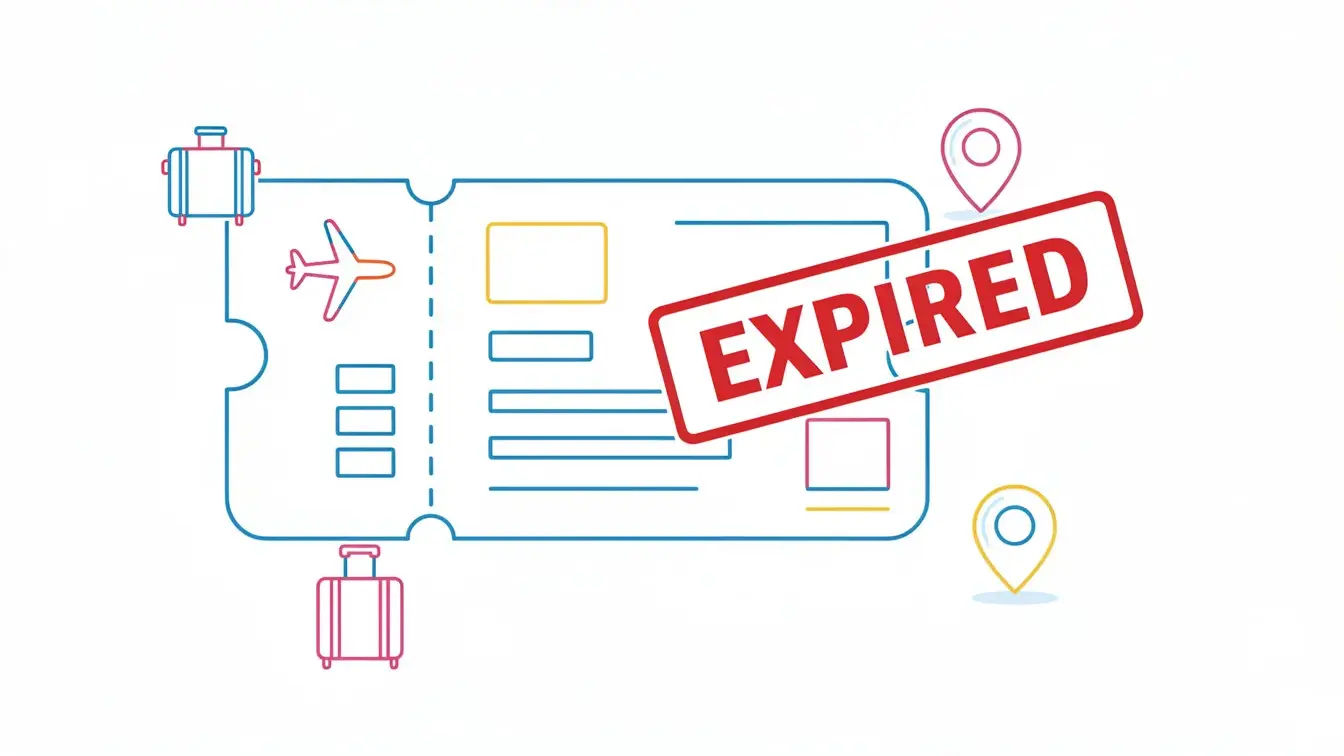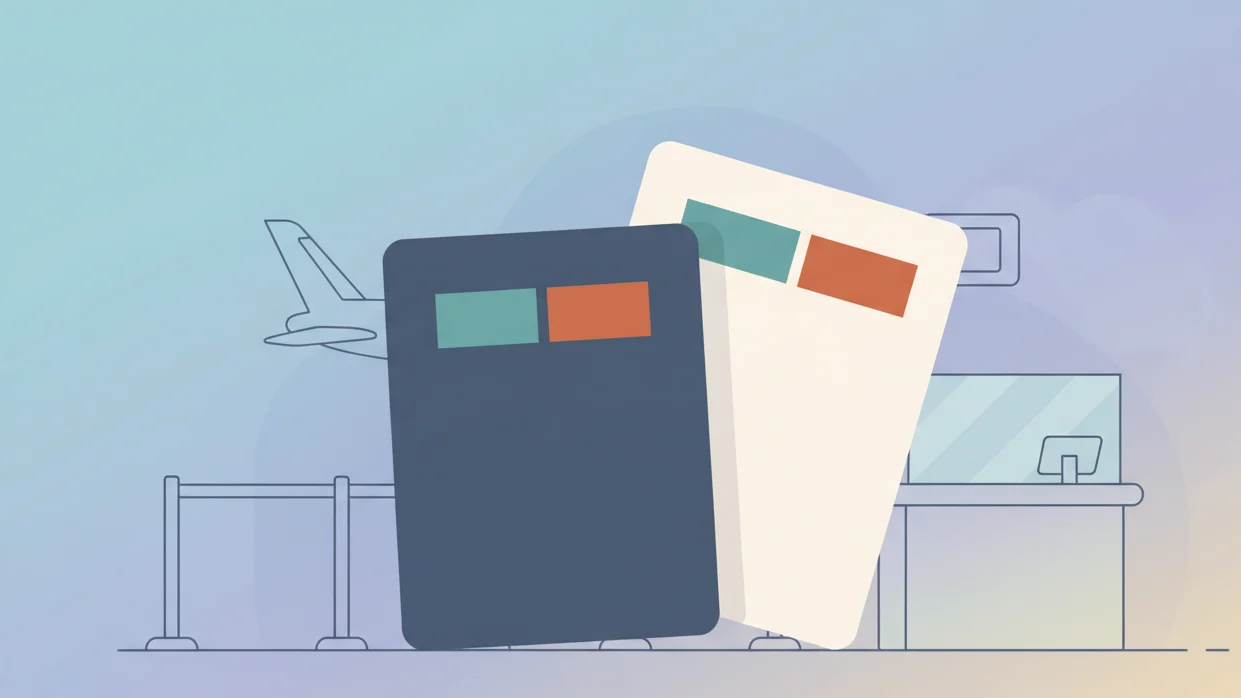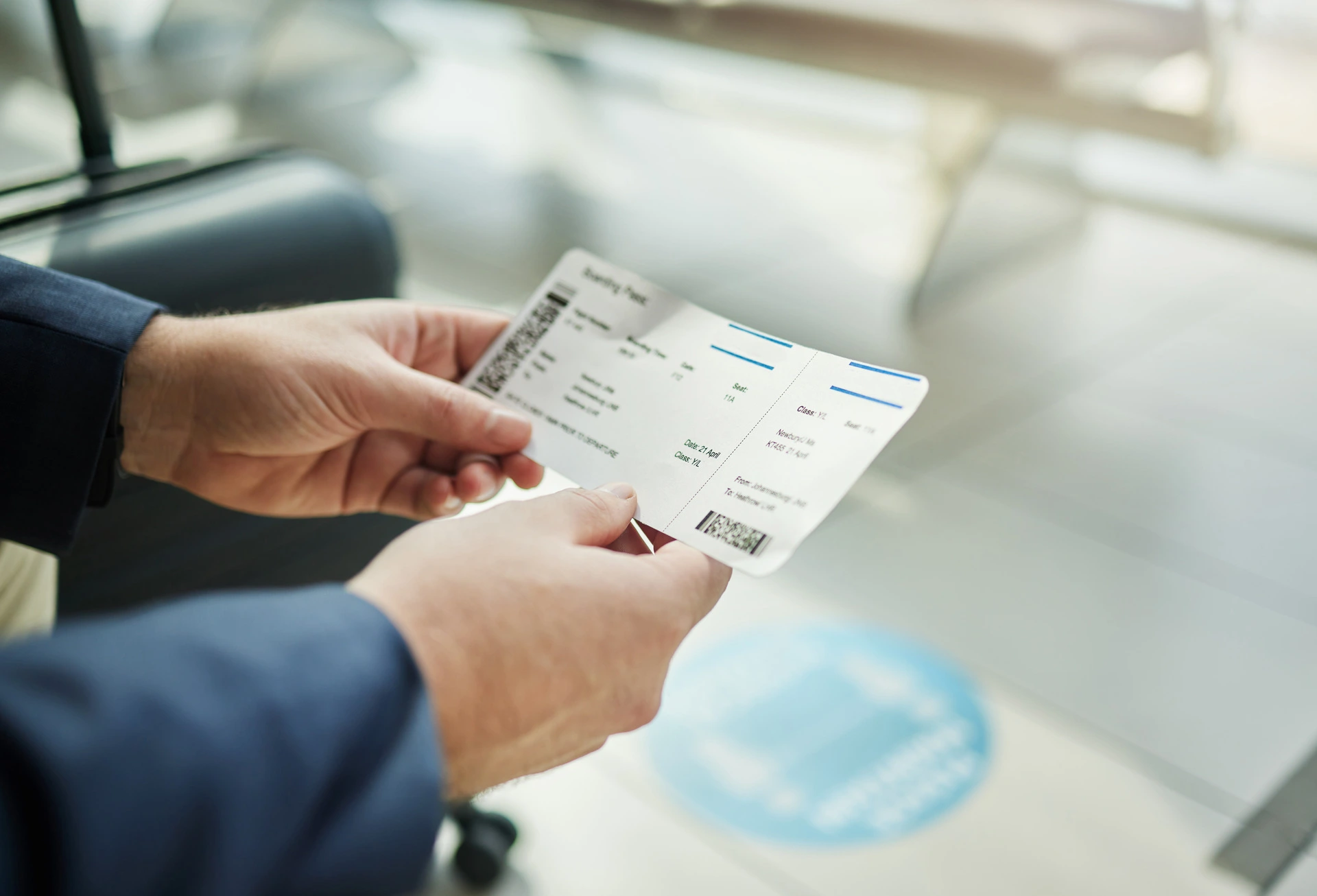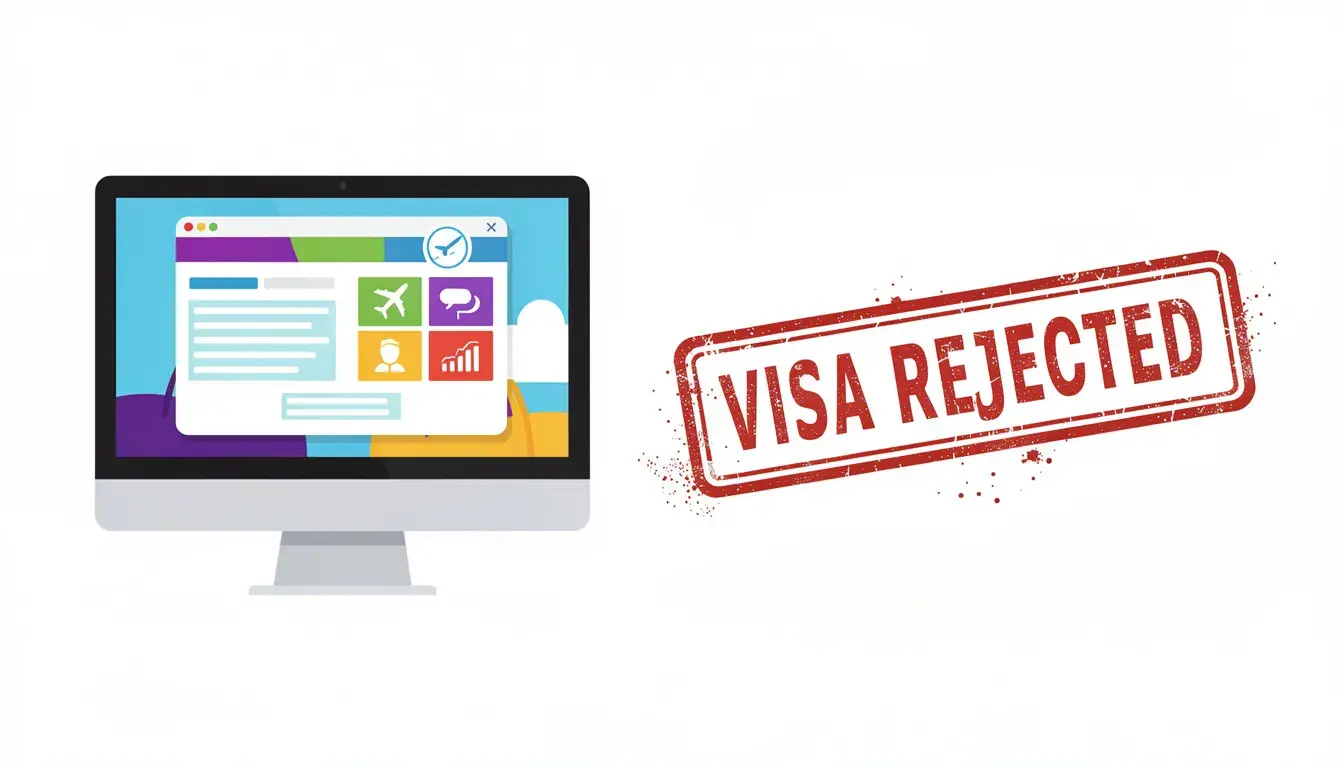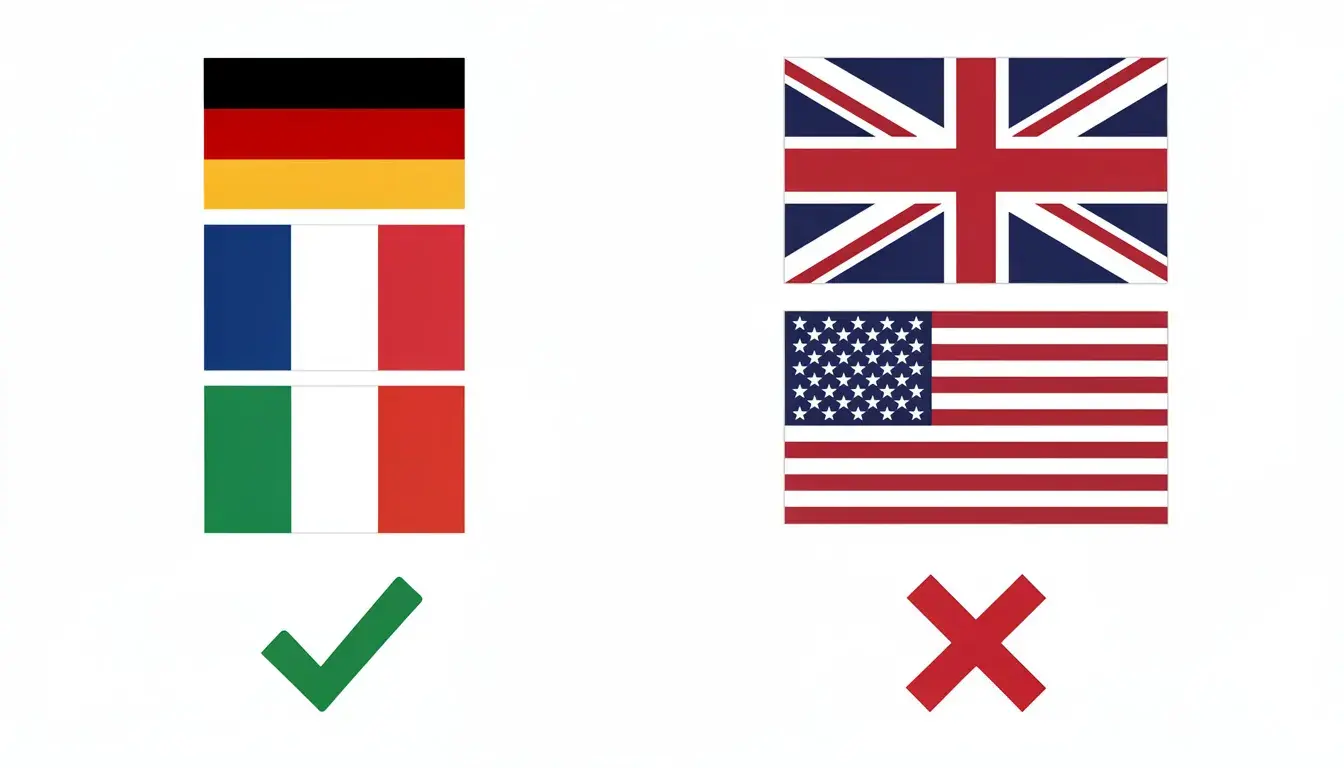Vietnam Visa Questions: Do You Really Need a Dummy Ticket?
You’re excited about Vietnam, and rightly so. It’s one of those destinations where the food, the energy, and the culture hit you all at once. But before that first bowl of pho, you want a smooth start at the airport and at the visa stage. That’s where the onward or dummy ticket question comes up for most travelers from India. Some people are told it’s mandatory, others say they were never asked, and the uncertainty alone can make the process feel trickier than it actually is. For more insights, check our FAQ or explore blogs on visa essentials.
We’ve seen how the rules play out across e-visas, consulate applications, and visa on arrival. The truth is simple. Vietnam doesn’t always demand an onward ticket on paper, but airlines and immigration officers often expect you to have one ready. Understanding when it matters will save you time, money, and unnecessary stress later. Learn about our story in the About Us section. Travel stress-free with our verifiable dummy ticket booking.
Yes — a dummy ticket is increasingly important for Vietnam visa applications because Vietnam Immigration requires proof of
before issuing approval. A verifiable dummy ticket with a real PNR (Passenger Name Record) confirms your intention to exit Vietnam within the allowed stay period. This protects you from buying an expensive full ticket before visa approval. Thousands of travelers from India, Philippines, UAE, and the US use dummyflights.com to get instant, verifiable dummy tickets accepted by Vietnam e-Visa, VOA, and embassy submissions. Last updated: November 2025 — verified with current Vietnam eVisa & Immigration travel-proof requirements.
How Vietnam’s Different Visa Routes Treat Onward Travel
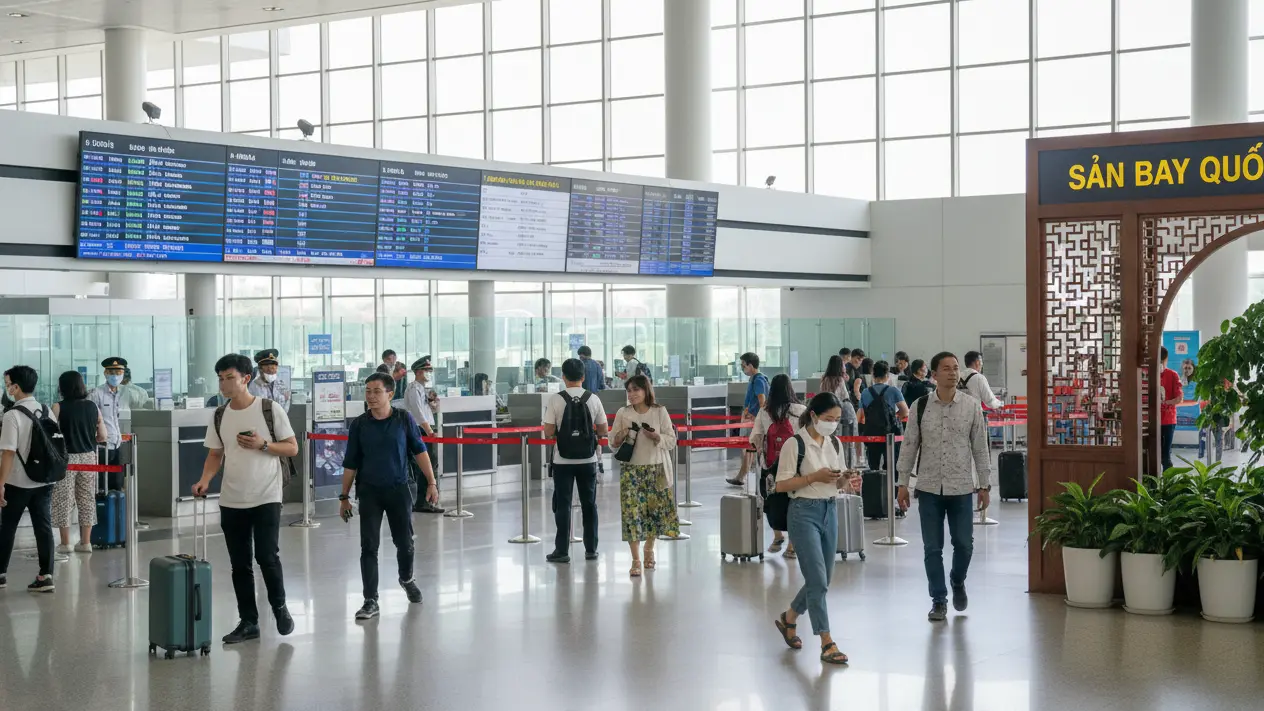
Before we get into the fine print of onward travel proof, let’s clear something up. Vietnam’s visa system isn’t one-size-fits-all. Each route has its own expectations, quirks, and pressure points where an airline or immigration officer may decide they want to see an onward ticket. If you understand how these routes work, you’ll know exactly when a dummy ticket becomes your safety net.
Let’s break it down in a way that actually helps you plan your trip with confidence. Secure your travel plans today with a quick dummy ticket booking.
How E-Visas Really Handle Onward Travel Requests
The Vietnam e-visa is the option most travelers from India prefer. It’s quick, digital, and doesn’t involve long embassy lines. The interesting part is that the official e-visa application itself usually doesn’t ask you to upload a return or onward ticket. That’s why many travelers assume they don’t need one at all. For more on e-visa processes, refer to the IATA guidelines for international travel standards.
But here’s where reality kicks in. Even though the e-visa portal might not demand an onward ticket, the system around it often does. Airlines at Indian airports regularly ask e-visa travelers to show their exit plan before letting them check in. They’re not doing it to make your life harder. It’s simply because the airline is responsible if you get turned away at the destination. So they want proof that you plan to leave within your permitted stay.
Some consulates and VFS centers also list return/onward bookings as “supporting documents,” especially for travelers who prefer applying through an embassy instead of the e-visa portal. They don’t always enforce it strongly, but it appears on document lists often enough that going without one is a gamble.
If you’re traveling with a clean itinerary and fixed dates, showing a fully refundable return ticket works fine. If your plans are flexible or you don’t want money tied up, a verifiable dummy ticket is usually the smartest way to handle this stage. To expand your knowledge, dive into our blogs on flexible travel planning.
Why Visa On Arrival Approval Letters Change the Dynamics
If you’re using a visa on arrival (VOA) approval letter, the situation shifts again. You might think that the approval letter alone is enough to board your flight, but most airlines don’t see it that way. They want to make sure you aren’t flying one-way with no visible plan to exit Vietnam.
Travelers using VOA approval letters are among the most frequently asked to show a dummy or confirmed onward ticket at check-in. It makes sense when you look at it from the airline’s perspective. Unlike an e-visa, a VOA approval letter is not the visa. It’s just permission to get the visa at the airport. And without proof of onward travel, the airline may decide it’s safer not to board you at all.
At the arrival airport in Vietnam, immigration officers may also ask for onward proof, though less often than airlines. When they do ask, it’s usually tied to your travel pattern. Solo travelers, long stays, or backpack-style itineraries sometimes attract extra questions. If your dates look open-ended, having a dummy ticket ready helps you move through immigration smoothly without needing to explain your trip in too much detail.
When Visa-Exempt Stays Still Expect Proof of Departure
Some travelers assume that short visa-exempt routes automatically mean zero questions. But Vietnam has special categories and regional exceptions where proof of outbound travel becomes surprisingly relevant.
Phu Quoc, for example, allows visa-free entry if you’re visiting only the island and staying fewer than 30 days. The catch is that the exemption is tied directly to proof that you’re exiting Phu Quoc or Vietnam within that period. Many travelers forget this and show up without any evidence of onward travel. The result is usually a time-consuming discussion with immigration or a denied boarding at your departure airport.
Even for standard short-stay entry, immigration officials sometimes ask for exit plans when a traveler’s profile raises questions. It’s not about suspicion. It’s simply about verifying that your stay aligns with the rules. If your itinerary is open-ended, a dummy ticket becomes your easiest way to show structure without committing to dates you might change later. Questions on exemptions? Our FAQ covers it.
Why Airlines Are Stricter Than Vietnam Itself
Here’s the part many travelers overlook. You’re far more likely to be asked for an onward ticket by the airline at your Indian departure airport than by Vietnam’s immigration officers.
Airlines follow their own internal rules, and these rules are usually stricter than the destination country’s official requirements. They get fined if they transport someone who isn’t allowed entry. So they play it safe.
Carriers operating routes between India and Vietnam—including low-cost carriers—tend to be extra cautious. Staff may ask for onward proof without exception, especially for travelers on one-way bookings or those entering with an approval letter instead of a stamped visa.
So even if Vietnam technically doesn’t require an onward ticket for your specific visa category, the airline will still ask. That’s why dummy tickets have become common practice among experienced travelers.
Why Consulates Sometimes List It, Even If It’s Not Mandatory
Embassy and consulate documentation checklists can be confusing. Some list a return or onward ticket as “recommended,” some list it as “supporting,” and others list it without clarifying whether it’s mandatory.
This happens because consulates in different countries follow slightly different document standards. For travelers from India, these lists often appear conservative because the consulates want applicants to show clear travel intent. It doesn’t mean every application will be rejected without an onward ticket. It simply means your file looks cleaner when you include one.
If you’re submitting documents through VFS or directly at a consulate window, a dummy ticket is usually the simplest solution. It proves your travel intent without forcing you to spend on a full-priced ticket before getting the visa.
A Simple Way to Understand All This
If you’re ever unsure whether you’ll need a dummy ticket for Vietnam, just ask yourself three questions:
- Will I check in at an Indian airport with a one-way ticket?
If yes, the airline will probably ask for onward travel. - Is my visa type one that often attracts more scrutiny (VOA approval letter, flexible stay, open routing)?
If yes, having proof avoids unnecessary delays. - Does my travel pattern look open-ended or uncertain?
If yes, immigration may ask for your exit plan.
When even one of these applies, carrying a dummy ticket is the sensible choice.
Vietnam’s official rules around dummy tickets can look relaxed, but the real gatekeepers are airlines and immigration officers. They’re the ones who decide whether you board your flight or walk into the country without questions.
A verifiable dummy ticket solves this problem cleanly. It gives you the exact proof airlines expect without forcing you to buy an expensive refundable return ticket months before your trip. And when you choose your provider wisely, the document looks identical to a standard airline-issued reservation.
Understanding these visa routes helps you avoid the most common point of failure for travelers from India. Once you have your onward travel sorted, the rest of your Vietnam trip becomes much easier. To learn more about our commitment to reliable services, visit About Us.
When Your Onward Ticket Actually Matters For Vietnam Travel
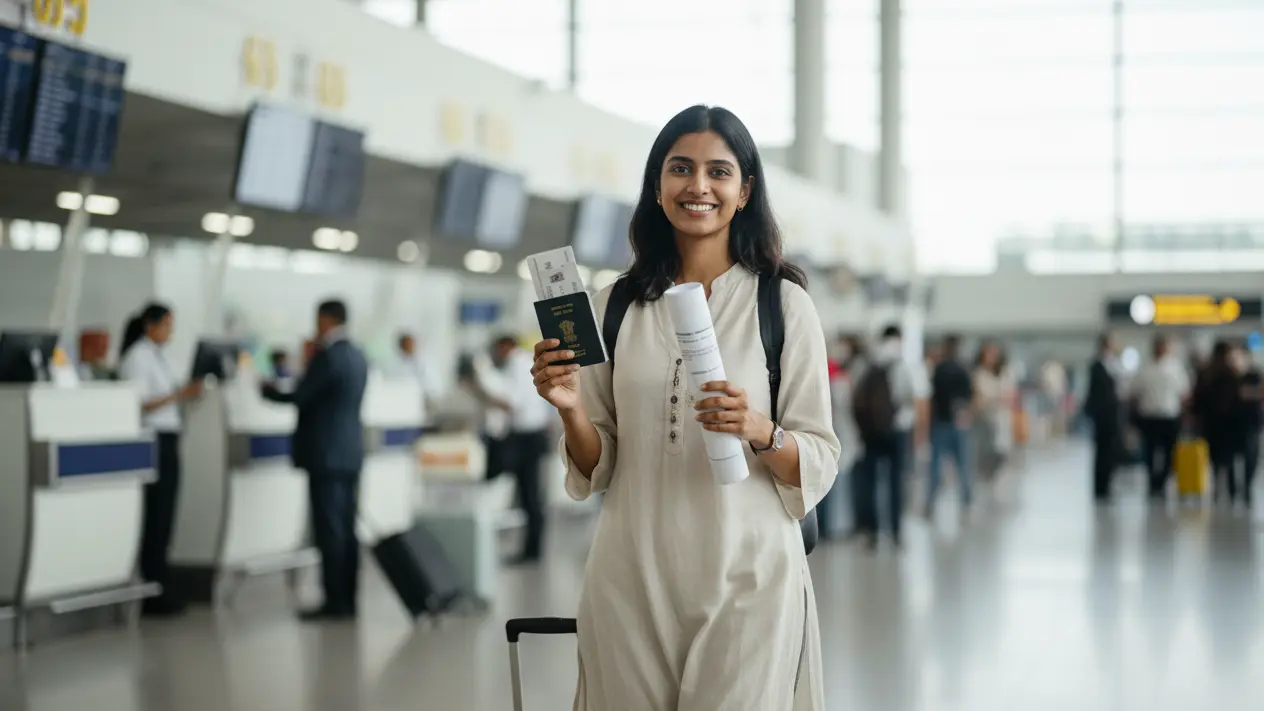
Before you start buying reservations or worrying about paperwork, it helps to understand why onward travel proof becomes a deciding factor for Vietnam-bound travelers from India. The rules can feel inconsistent because the need for an onward ticket doesn’t come from just one authority. It comes from several checkpoints, each with its own expectations.
Once you know where these checkpoints are, planning becomes easier and far more predictable. For peace of mind at check-in, book a dummy ticket. 👉 Order your dummy ticket today
The Airline Check-In Counter Is Your First Real Test
Most Indian travelers assume immigration in Vietnam will be the toughest part. In truth, the first—and often strictest—screening happens right at your departure airport in India.
Airline staff follow international carrier regulations, not just Vietnam’s rules. If they carry a passenger who gets refused entry, the airline must pay penalties, cover return transport, and deal with additional administrative trouble. That’s why airline agents always err on the safer side.
From our experience and what countless travelers report, these are the situations when airline staff almost always ask for onward proof:
- You’re traveling on a one-way ticket with an e-visa.
Airlines want to ensure you won’t overstay. - Your visa on arrival letter is freshly issued.
An approval letter isn’t the visa, so they check supporting documents more carefully. - Your travel pattern looks open-ended.
Backpackers, digital nomads, and long-stay travelers are asked more often. - You’re flying a low-cost carrier out of India.
These airlines follow rigid internal rules to avoid penalties.
If you can’t show an onward booking, the airline may refuse boarding until you buy something immediately at an inflated last-minute price. This is where most travelers panic and rush into an expensive, non-refundable booking they never planned to use.
Having a dummy ticket avoids all of this and keeps your check-in smooth. To avoid common pitfalls, read our blog posts on airline check-in tips.
Immigration Officers Look At Your Exit Plan Differently
Vietnamese immigration officers don’t usually start conversations by asking for onward travel proof. They look at your passport, your visa type, and your entry purpose first. But this doesn’t mean onward proof is irrelevant here.
The officers ask for onward travel under specific circumstances:
- Your stay length looks too open-ended.
For example, you enter with a 30-day or 90-day visa and cannot explain your return plan. - You’re entering with a visa approval letter.
They sometimes check to confirm that your exit plan matches your visa duration. - Your travel history shows frequent long stays abroad.
Some officers may want reassurance that you’ll exit before your permitted stay ends. - You appear uncertain about your itinerary.
Hesitation or mismatched answers can trigger additional questions.
Immigration officers are not trying to trap travelers. They simply want to confirm your visit aligns with the visa type you’re entering with. A dummy ticket helps you give a clear, structured answer that satisfies the process without unnecessary delays.
When Consulates And VFS Centers Add Onward Tickets To Their Lists
Many Indian travelers still apply for Vietnam visas through consulates or VFS centers. While e-visas have become popular, embassy-based visas continue to be used for long stays, multiple entries, or work-related travel.
Consulates often include onward or return tickets in their “recommended documentation” section. They usually treat these documents as supportive evidence of genuine travel intent.
Here’s where the confusion begins. These lists don’t always say if the ticket is mandatory or optional. That leaves travelers debating whether to submit one.
From a practical standpoint, including an onward ticket offers clear advantages:
- It shows your stay has a plan and a natural end date.
- It reduces the chance of consulate officers marking your file incomplete.
- It aligns your application with common visa-processing expectations.
If your visa is being submitted in person, in front of an officer or VFS staff, they may even ask directly for proof of your return plan. When you hand over a dummy ticket, your application looks properly structured without committing you to non-refundable flights.
Proof Of Onward Travel Is Also A Safety Net For Multi-Destination Trips
Many Indian travelers planning a Vietnam trip also include countries like Cambodia, Laos, Thailand, or Singapore in the same itinerary. In these cases, having a clear onward travel document becomes even more important.
When you’re visiting multiple countries in the region, three things can happen:
- Airlines ask for onward travel for every leg of your itinerary.
Especially on one-way segments. - Transit airports may request onward proof even if your final destination doesn’t.
- Your multi-country route may appear complex without clear exit points.
If your plan includes open-ended segments, a verifiable dummy ticket can stabilize your entire itinerary. It gives you the flexibility to adjust dates later without losing money. For multi-destination advice, our FAQ has detailed answers.
When A Fully Refundable Ticket Makes Sense—And When It Doesn’t
Some travelers assume that the safest way to handle onward travel proof is to buy a fully refundable ticket and cancel it later. While this works in theory, it often creates more problems than expected.
Refundable tickets cost significantly more—often three to four times the cost of a dummy reservation. And refunds take weeks. Airlines also sometimes apply cancellation fees or partial refunds even when the ticket says “flexible.”
Refundable tickets make sense only if:
- You genuinely plan to use the booking if your visa gets approved.
- You want a guaranteed seat on a specific return flight.
- You don’t mind tying up money temporarily.
But for most India-based travelers visiting Vietnam for tourism, work meetings, or short family trips, refundable bookings simply aren’t worth the cost. That’s why dummy tickets have become the more practical solution.
How A Dummy Ticket Helps You Avoid Unexpected Travel Disruptions
A properly issued dummy ticket solves real-world travel problems. It’s not a shortcut. It’s a structured document that does exactly what check-in staff, immigration officers, and consulate reviewers want to see.
Here’s what the right dummy ticket gives you:
- Verifiable PNR
This is the single most important detail. Airlines should be able to confirm the record in their system instantly. - Correct name matching your passport
Any mistake here can lead to immediate rejection. - Accurate travel dates that match your visa validity
Dates that fall outside your approved stay raise flags. - A clear exit route from Vietnam
Even if your return is flexible, the itinerary shows a logical departure. - A legitimate PDF reservation
It should look identical to a normal airline confirmation.
This is the part where many travelers from India unknowingly make mistakes. They create fake-looking itineraries online or download templates that don’t match real airline formats. Airline staff spot these instantly. Immigration officers can also check authenticity with a single call.
A Quick Real-World Example You Can Learn From
A traveler flying from Delhi to Hanoi on a one-way ticket wasn’t asked for anything during check-in and assumed she was safe. But upon landing, the immigration officer asked how long she planned to stay. She explained it was a flexible trip. Without an exit plan, the officer asked her to provide proof of onward travel. She didn’t have one.
The officer eventually allowed her entry after a long interview, but her baggage was already offloaded and the entire process delayed her by almost two hours. This could have been avoided with a simple dummy ticket.
A similar scenario happens to hundreds of Indian travelers every year, especially those entering Vietnam with long-stay visas or flexible plans.
Why A Dummy Ticket Is Often The Greener, More Flexible Choice
When you compare a dummy ticket with a fully refundable booking, the advantages are clear:
- It costs significantly less.
- It avoids locking your money into a booking you might not use.
- It allows unlimited date change flexibility if you choose the right provider.
- It protects you at every checkpoint—airline, immigration, and consulate.
For travelers who prefer low-commitment planning, a dummy ticket is the easiest way to satisfy requirements without losing freedom.
When you choose a provider offering verifiable PNRs, instant delivery, and realistic airline formats, the process becomes quick and dependable.
It’s worth mentioning here that services like dummyflights.com offer verifiable dummy reservations that meet airline expectations. These documents come with live PNRs, instant delivery, and the flexibility to update travel dates without extra charges. It’s the type of small preparation that prevents major last-minute stress.
The Bigger Picture For Vietnam-Bound Travelers
Onward travel proof isn’t always clearly stated in Vietnam’s official guidelines, but it plays a major role in how smoothly your trip begins. Whether you’re checking in at the airport, arriving in Vietnam, or submitting documents at a consulate, having a proper onward ticket ensures you clear each stage confidently.
When you treat this as a standard part of your travel checklist—like passport scanning, hotel confirmations, or currency exchange—it stops feeling confusing. It becomes routine, predictable, and stress-free.
Once your onward travel document is sorted, you’re in a much stronger position to enjoy the rest of your Vietnamese adventure without any paperwork surprises.
The Real Moments When An Onward Ticket Can Make Or Break Your Vietnam Trip
You already know that Vietnam doesn’t always list an onward ticket as a hard requirement for a tourist visa. But here’s where things get interesting. Even when a rule isn’t written, the people you meet along the way can still ask for proof that you plan to exit Vietnam within the validity period of your stay. And in real travel situations, that difference matters far more than what’s printed on any official website or visa information page.
Let’s walk through the moments that matter most for an Indian national. These are the checkpoints where your trip can be delayed, questioned, or even stopped if you cannot show an onward booking. When you understand these situations, you prepare with confidence and avoid spending too much on a non refundable return ticket. Make your visa process smoother by using a reliable dummy ticket booking.
Why Airlines in India Are the First Gatekeepers You Need to Prepare For
Before you even think about landing at one of Vietnam's international airports, your first real test is at the check-in counter in India. Airlines follow a straightforward rule. If they fly someone who is denied entry, the airline pays for the passenger’s return flight. Because of this, many staff members insist on seeing an onward ticket, even when Vietnam immigration doesn’t formally require it in its visa requirements.
We’ve seen this happen often with Vietnam-bound travellers departing from:
- Delhi
- Mumbai
- Bengaluru
- Chennai
- Kolkata
Staff at these airports prefer to play it safe. Even if your visa approval letter or e visa application is completely valid, they might still ask when and how you plan to exit Vietnam. Solo travellers and backpackers are questioned more often because airlines assume they change plans frequently.
This isn’t about your intentions. It’s simply policy tied to the process airlines must follow. And the best way to avoid pushback is to carry an onward booking that looks official, includes a realistic date, and matches the passport details you used in your Vietnam visa application or visa application form.
When Immigration Officers in Vietnam Expect Proof Of Exit Plans
Once you enter Vietnam, most travellers pass through the immigration department smoothly. But there are situations where officers ask to confirm your onward travel. This can happen even if you hold a valid visa, an electronic visa, or you applied through the Vietnam electronic visa portal.
Common scenarios include:
- Your stay duration looks unusually long for a visitor.
- You enter on a new passport with very few travel stamps.
- You appear unsure about your travel plans.
- You arrive during peak tourism seasons.
- You’re entering through smaller airports where officers are more cautious.
Vietnam’s immigration process is generally friendly. But sometimes officers want to be sure that you will exit Vietnam within the duration noted on your entry visa. A dummy booking is often enough because they don’t need proof of payment, only proof that plans exist. E visa holders appreciate this flexibility because many trips are planned last-minute.
Many Indian citizens share that officers sometimes ask:
- “When do you leave?”
- “Which city will you fly out from?”
- “Do you already have a booking?”
If you hesitate or cannot answer confidently, you may face extra questions. A clear dummy itinerary keeps everything simple.
Why Some Vietnam Consulates Still Suggest Exit Tickets As Supporting Documents
Vietnam’s online system for an e visa is straightforward, but some travellers still apply through an embassy or authorized center in India. They do this when:
- Their travel dates are urgent.
- Their passport name has complex spellings.
- They want multiple entry permission.
- They prefer an offline application.
- They need to fix details on a new visa after an error.
In such situations, consulates sometimes ask for onward travel as part of the supplementary required documents. It’s not mandatory, but it strengthens your case and may speed up the processing time because officers see that your plans are organized.
Anything that removes doubt works in your favor, especially if you’re applying for a business visa or dealing with guaranteeing agencies that handle applications on your behalf.
When Using a Dummy Ticket Is Smarter Than Buying a Refundable Ticket
Many travellers think buying a refundable ticket solves everything. But refundable fares come with several problems:
Refunds take 7 to 30 days.
Airlines charge cancellation fees.
Some routes refund only partially.
Exchange rates swing during processing.
Payment gateways deduct extra fees.
Why lock away so much money when a dummy booking can support your visa on arrival or Vietnam e visa process more efficiently?
A dummy reservation helps you:
Stay flexible if plans change.
Match the duration mentioned on your approval letter.
Adjust dates quickly if needed.
Avoid tying up funds right after you apply online.
And since the immigration department may verify your exit date based on your ticket, keeping a flexible document helps.
Transit Situations Where Border Staff Expect Clear Exit Plans
Transit flights create another layer of checks. These scenarios are extremely common:
Routing through Malaysia, Singapore, Japan, or Thailand with separate tickets.
Flying low-cost carriers that enforce stricter exit-plan checks.
Travelling during peak Southeast Asian holiday seasons.
Several countries enforce their own onward-travel rules even if your final destination is Vietnam. So your onward ticket protects you not only during entry but also during transit. It’s an alternative way to avoid being forced to buy a walk-in ticket at other locations when travelling through busy hubs.
Some travellers were even stopped from boarding in India when they couldn’t show proof of onward travel.
Backpackers, Flexible Planners, and Long-Stay Travellers Need It More
Not everyone comes with a fixed schedule. Many visitors prefer long yet flexible stays before they exit Vietnam. They may work remotely, backpack across regions, or hop between cities.
Immigration officers may not understand your open-ended style unless you show at least an approximation of your exit date. A dummy reservation works well because it:
Shows structure without forcing real commitments.
Allows flexibility on choosing where to exit Vietnam.
Avoids early spending on real tickets.
Aligns easily with the entry conditions on your visa permits.
If you applied for single entry, multiple entry, visa exemption, or an entry visa upgrade later, it keeps the timeline consistent.
If Your Visa Approval Letter Has Limited Validity, Your Ticket Must Match
Vietnam visas and approval letters come with specific windows. If your ticket dates don’t match the valid passport dates, your entry may look questionable.
Common mistakes include:
Exit date outside allowed duration.
Arrival date different from what’s listed on your application form.
Ticket showing a city not matching your e visa details.
Incorrect date formats submitted through the website.
A proper onward ticket must match your visa stamp timeline. Otherwise, airlines may think you intend to overstay.
The Situations Where Not Having One Becomes a Real Problem
Indian travellers commonly face issues such as:
Denied boarding at the airport counter.
Extra questions at immigration.
Confusion during visa on arrival processing.
Transit delays in countries like South Korea.
Last-minute panic when officials unexpectedly check documents.
Being forced to buy expensive real tickets during rush periods.
A simple onward booking avoids these stressful moments.
A Dummy Ticket Removes Uncertainty Without Locking You In
Your trip to visit Vietnam should feel exciting. And when you understand how immigration, airlines, and transit hubs check onward travel, you prepare with clarity.
A dummy reservation is:
Proof of exit
A smoother step during entry
A budget-friendly option
A practical tool for applicants who need flexibility
It keeps your journey stress-free and helps you enter Vietnam with confidence
Why Choosing A Dummy Ticket Often Beats Every Other Proof Of Travel Option
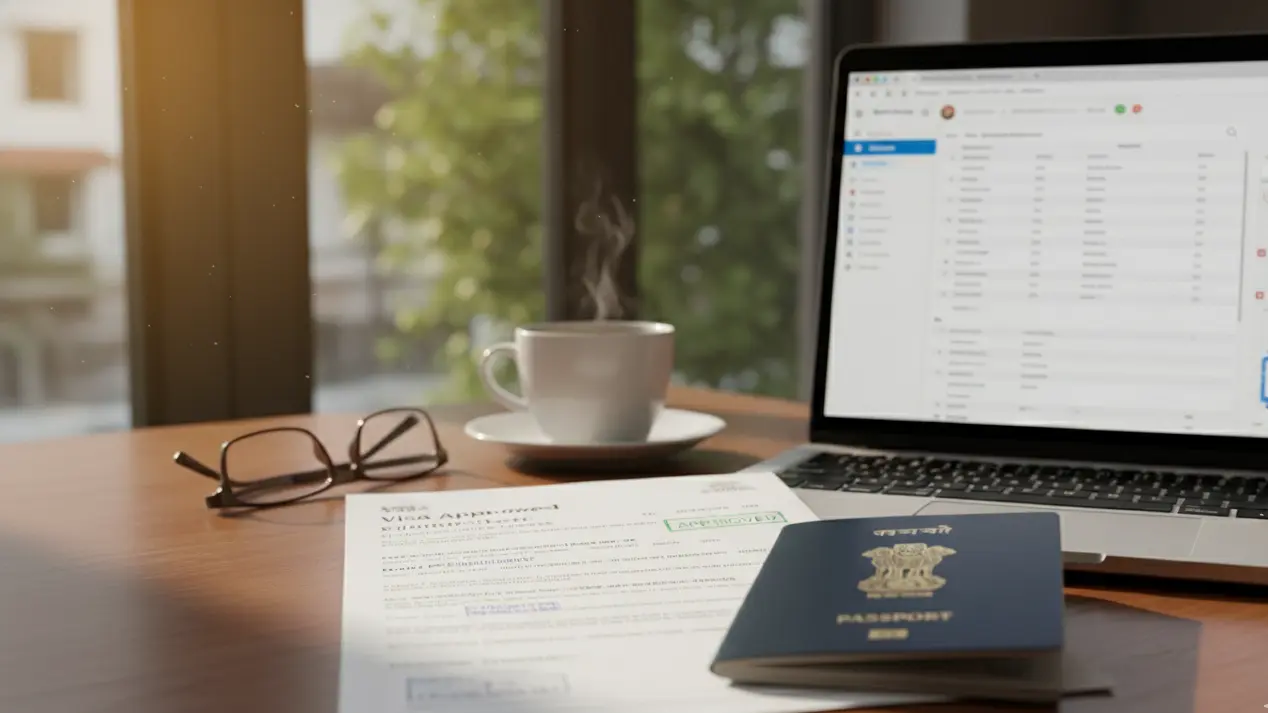
Before you commit to any onward-travel document, it helps to understand the choices available to you. When Indian travellers plan for Vietnam, they usually compare dummy tickets, flexible fares, refundable bookings, and alternate proofs like hotel reservations or internal transport tickets. These all serve a purpose, but they aren’t equally practical. Some cost too much. Some don’t match the visa conditions. Others simply don’t satisfy airline or immigration expectations.
Let’s break down each option clearly so you know exactly why a dummy ticket often becomes the smartest and safest choice. Don’t risk delays or extra costs—get your dummy ticket booking.
The Trouble With Fully Refundable Tickets That Most Travelers Don’t Realize
Many travelers assume refundable fares are the safest solution. You pay upfront, submit your ticket, fly when ready, and take the refund if your plans change. In theory, it sounds perfect. But when you’re applying for a Vietnam visa or preparing for airport checks in India, things rarely work so smoothly.
Refundable tickets come with real-world problems like:
- High upfront cost
- Long refund timelines
- Hidden cancellation fees
- Reduced refund amounts
- Currency fluctuation losses
- Strict cancellation windows
For example, booking a refundable ticket from Delhi to Ho Chi Minh City can easily cost upwards of ₹35,000 to ₹45,000. Cancelling it later might return only 70 to 90 percent of your money after fees. And if you pay with a credit card, you might wait weeks for your bank to process the refund.
Vietnam visa timelines also vary. Sometimes approvals are quick. Sometimes they’re delayed due to holidays or peak-season loads. If your refundable ticket doesn’t match the new dates, you either cancel it (and lose money) or shift it (and pay modification charges).
This is why so many Indian travelers decide they can’t tie up large sums of money just to satisfy a proof-of-travel requirement that airlines and immigration may or may not check. For practical travelers, refundable fares become a last resort rather than a preferred option.
Flexible Tickets Still Lock Up Money And Don’t Solve The Real Problem
Flexible tickets sound comforting because they let you change dates easily. But flexibility usually comes with:
- Higher fares compared to standard tickets
- Extra charges for rebooking
- Limited flight availability on new dates
- Restrictions based on airline rules
And here’s the bigger issue. Flexible tickets still force you to:
- Pay the full fare upfront
- Match the exact visa validity
- Predict your travel timeline before approval
A flexible ticket works only if you’re completely certain your Vietnam visa will be approved within a specific window. But most Indian travelers applying through e-visa portals or consulates don’t have that guarantee.
So while flexible tickets reduce some risk, they still don’t offer the freedom or cost-efficiency that dummy reservations provide.
Why Internal Transport Tickets Don’t Always Convince Immigration Or Airlines
A few travelers try to use other “exit plans” to show they intend to leave Vietnam. Common examples include:
- Train tickets
- Bus tickets to Cambodia or Laos
- Ferry tickets
- Domestic flight bookings
These can be helpful during your actual trip, but they have weaker value as official proof of onward travel. Airline staff often see bus or train tickets as unreliable because the responsibility is on them if you’re refused entry at the destination airport.
Immigration officers, especially in Vietnam, tend to prefer:
- A flight itinerary
- A proper reservation
- A verifiable booking code
Ground transport tickets may be accepted sometimes, but they are more likely to trigger questions or requests for additional proof.
If your goal is to avoid hassles, these alternatives simply don’t offer the same confidence as a flight itinerary.
Hotel Bookings Alone Don’t Prove When You’re Leaving
Hotel reservations help visa officers understand your travel plan. But they cannot prove your exit date. Hotels show where you’ll stay, not how or when you’ll depart.
Even if you attach a full hotel itinerary for your Vietnam stay, you might still be asked:
- “Which flight will you take out of Vietnam?”
- “What is your exit date? Can you show your booking?”
Hotels alone are never enough to satisfy airline staff in India. They might see the reservation but still refuse boarding until you show an onward booking.
A dummy ticket solves this instantly. It provides the missing link that completes your travel story.
The Dummy Ticket Advantage: Clarity Without Commitment
Dummy tickets feel effortless compared to every other option because they offer:
- A complete itinerary you can show to anyone
- Clear arrival and departure dates
- A verifiable PNR (when purchased from credible providers)
- Zero need to lock up money in costly fares
- Flexibility to adjust dates if your visa is delayed
This is exactly why Indian travelers heading to Vietnam depend on dummy bookings so often. They give you all the assurance without forcing you into a financial risk.
With Vietnam specifically, dummy bookings become even more useful because the visa process has:
- Multiple approval timelines
- Varying validity windows
- Differences between e-visa, consulate, and visa-on-arrival applications
It’s one of the rare destinations where flexibility is not just convenient. It’s essential.
When Dummy Tickets Are Safer Than Showing Real Tickets
This sounds unusual, but it’s completely true. A dummy booking can actually protect you from mistakes that often happen with real tickets.
Here’s how:
- If your visa dates shift, you don’t lose money
- If Vietnam issues different validity dates, you won’t face mismatch issues
- If your travel plans evolve, you avoid refund fights
- If you decide to change your exit city (like flying out from Da Nang instead of Hanoi), you can correct the booking without penalties
A dummy ticket keeps you agile. Real tickets restrict you.
And with Vietnam’s wide geography, many Indian travelers end up flying into one city and leaving from another. So keeping your exit flexible makes perfect sense.
A Good Dummy Ticket Should Always Look Clean And Professional
No matter which provider you use, a dummy ticket should have:
- Your exact passport name
- Correct passport number
- Proper Vietnam arrival and departure dates
- A real airline PNR or reference code
- A layout that resembles a regular airline ticket
- Matching details if submitted with hotel reservations
- Departure from a realistic airport (Delhi, Mumbai, Bengaluru, etc.)
This is where many free or poorly made dummy tickets fail. They’re either impossible to verify or contain incorrect spellings, odd itineraries, or mismatched dates.
That’s why travellers choose professional services that issue GDS-based reservations which look authentic and can be verified.
This is also where dummyflights.com becomes a smart choice. We provide verifiable dummy tickets built specifically for visa requirements, with live PNRs and instant delivery. When an airline staff member or immigration officer wants to check your reservation, you have a proper booking that passes verification.
And since Vietnam’s rules sometimes vary depending on airport or visa type, using reliable documents is much safer than experimenting with budget or unknown providers.
Dummy Tickets Also Work Perfectly For Multi-Country Southeast Asia Trips
India to Vietnam is a popular route. But many travelers extend their trip to include:
- Cambodia
- Thailand
- Laos
- Singapore
- Malaysia
- Philippines
When you’re moving across borders, your itinerary becomes fluid. A dummy ticket helps you maintain structure without sacrificing freedom.
For example:
- You might fly from India to Vietnam
- Then take a bus to Cambodia
- Then fly back to India from Bangkok
This kind of multi-country loop is common among Indian travelers. But airline staff often struggle to understand these open-ended routes.
A simple dummy exit ticket from Vietnam fixes that confusion. It satisfies the airline in India and the immigration officer in Vietnam, while you still keep the freedom to choose your actual exit path later.
When Dummy Tickets Save You From Last-Minute Airport Panic
Airport counters in India can be unpredictable. One staff member may not ask anything. Another may request multiple documents. And if they decide they want to see an onward booking, they won’t let you proceed without it.
This leads to two common scenarios:
Scenario 1
A traveller is asked for proof of exit from Vietnam. They don’t have it.
They panic. They frantically search online for a solution.
Scenario 2
A traveler is asked for onward travel.
They calmly show a dummy booking.
It’s verified instantly.
They check in without stress.
You always want to be in Scenario 2.
A dummy ticket is not about gaming the system. It’s about avoiding chaos during moments where decisions are made quickly and often inconsistently.
Dummy Tickets Fit Perfectly With Vietnam’s Flexible Travel Culture
Vietnam is a country where your plans evolve naturally. Maybe you’ll love Da Nang and decide to stay longer. Maybe you’ll cut a few days from Hanoi. Maybe you’ll take a spontaneous trip to Hoi An or Sapa.
A dummy ticket gives you the freedom to embrace this flexibility.
You’re not tied to your original plan.
You’re not locked into a flight you might not want.
You’re not using a ticket you may need to cancel.
It’s the perfect blend of confidence and freedom.
How To Pick A Reliable Dummy Ticket For Vietnam Tourist Visa
Before you finalize any onward booking, it helps to know what separates a clean, trustworthy dummy ticket from one that can cause trouble at the airport or during your visa process. Many Indian travellers end up facing unnecessary delays, mismatched documents, or awkward questions simply because they used a low-quality booking or entered the wrong details. A good dummy ticket should work smoothly in every situation, whether you’re dealing with an airline staff member in Delhi or an immigration officer in Ho Chi Minh City.
Why Authenticity Matters More Than Anything Else When Choosing A Provider
The first thing you want from any dummy ticket is reliability. Airline staff in India don’t care where you purchased it from. They only care about one thing: whether the booking looks legitimate and can be checked in the airline system. If your reservation cannot be verified, staff may refuse to accept it because they are responsible for ensuring you meet Vietnam’s entry guidelines.
Here are signs your dummy ticket is trustworthy:
- It includes a real PNR or booking code
- It is created through an airline GDS (global distribution system)
- The booking looks like an actual flight itinerary, not a PDF template
- The airline and route make logical sense
- The dates match your stated travel plan
These elements ensure that if the airline checks the PNR at the counter, it appears active. This is exactly why you should avoid free templates, unverified PDFs, or suspiciously cheap “dummy tickets” from unknown websites or social media ads.
Reliable providers like dummyflights.com issue verifiable reservations with active PNRs, making them safe to use for Vietnam visa submissions or airline check-in. You want that level of reassurance because Vietnam’s entry rules sometimes vary across airports, and using documents that stand up to verification is the safest approach. Ensure your onward travel is verified by choosing to book a dummy ticket
The Key Details Your Dummy Ticket Must Always Include
A strong dummy ticket isn’t just about having a PNR. It’s about making sure every detail lines up perfectly. Airline staff often cross-check your booking with your passport, visa dates, and even your return plan. If something looks off, they may escalate it to a supervisor.
Your onward booking should always include:
- Full name exactly as in your passport
- Correct passport number
- Arrival and departure airports that make sense
- Travel dates within your visa validity
- Logical flight routes (For example: Delhi to Ho Chi Minh, not Ahmedabad to Da Nang via four unrelated countries)
- Departure from the same country you’re visiting
Don’t underestimate the importance of matching names exactly. Many Indian passports include middle names, initials, or combined surnames. If your dummy ticket spells your name differently, the airline might assume it’s a different passenger entirely.
For Vietnam specifically, the arrival and exit points matter. If you apply for an e-visa mentioning “Hanoi Airport” as your entry point, your ticket should also reflect that arrival airport. Mismatching this raises unnecessary flags.
Why Date Matching Can Make Or Break Your Check-In Experience
Date mismatches are among the most common mistakes Indian travelers make with dummy tickets.
Many travelers select random return dates, thinking it doesn’t matter since it’s only a reservation. But it does matter. Airlines check that your exit date falls within your approved visa duration. If the date appears beyond your allowed stay, they may deny boarding because they assume you’re planning to overstay.
Here’s what you want:
- Your arrival date matches the visa validity
- Your exit date falls comfortably within the duration allowed
- Your onward booking is active at the time of travel
- The trip timeline looks structured and realistic
For Vietnam, e-visas usually allow a single entry for a fixed period. If your dummy ticket shows a return date after this window, you may be asked to correct it on the spot. Airline counters are busy, and many travelers panic in these situations.
A little date planning goes a long way. For more on date alignment, see our About Us page for expert tips.
Avoid These Common Amateur Mistakes That Get Travelers Questioned
Even experienced travelers make avoidable mistakes with dummy tickets. And when authorities see inconsistencies, they get cautious.
Here are the biggest errors to avoid:
- Using a ticket with an expired hold
Many free dummy tickets expire within 24 to 48 hours. If staff check the PNR and it shows “inactive,” your document becomes useless. - Entering incorrect passport details
One wrong digit can make the entire booking invalid. - Using unrealistic flight routes or strange connections
Border staff sometimes question illogical itineraries. Keep the route simple. - Mixing your hotel dates with mismatched flight dates
If your hotel reservation ends on January 15 but your onward flight shows January 25, that inconsistency may trigger questions. - Submitting a booking that doesn’t cover transit countries
If you transit Kuala Lumpur or Bangkok, the onward ticket matters for those countries too. - Using a document that looks overly formatted or edited
Airlines are trained to spot tampered PDFs. Never risk it.
Avoiding these mistakes ensures your onward booking works the way it’s supposed to.
How To Choose A Provider That Won’t Leave You Hanging At The Airport
When picking a dummy ticket provider, focus on what helps you at check-in and immigration. A provider should offer:
- Fast delivery
- Verifiable reservations
- Clear ticket format
- Accurate passenger details
- Flexible date changes
- Live customer support
Some travelers only realize the importance of flexibility when their Vietnam visa approval arrives with different dates than they expected. Being able to adjust your dummy ticket quickly is a huge advantage.
This is where dummyflights.com becomes useful. Our reservations come with a verifiable PNR and unlimited date changes, which is especially helpful when Vietnam’s visa approval timing shifts. Since all bookings are generated through airline reservation systems, they pass verification checks easily.
Matching Your Dummy Ticket With Your Entire Travel Plan
A dummy ticket isn’t a standalone document. It should seamlessly support the rest of your travel files. Immigration officers and airline staff look at the whole picture.
Your documents should form a clean timeline:
- Visa approval or e-visa
- Arrival flight
- Hotel stay
- Exit ticket from Vietnam
When all these details align, your trip looks organized and credible.
For example:
If you tell the airline you will leave Vietnam after visiting Da Nang, but your onward ticket departs from Hanoi, that inconsistency may prompt further questions. These details matter more than people assume.
Why Verifiability Is the Most Important Feature
One of the biggest advantages of using a high-quality dummy ticket is verifiability. Staff at airline counters sometimes type your PNR into their system to check if it’s active. If it shows up as valid, you’re cleared instantly. If not, you have to explain yourself.
This is why:
- Real GDS bookings always pass checks
- Fake PDFs or unverified templates get rejected
- Professional dummy reservations save the day
Vietnam doesn’t require airlines to verify every booking. But when they choose to, your document must hold up. Otherwise, you risk being told to buy a last-minute ticket at airport prices.
Make Sure The Flight Route Looks Logical For Indian Travelers
When you choose your onward ticket, pick a route that looks normal for Indian tourists. Vietnam has three major international airports: Hanoi, Ho Chi Minh City, and Da Nang. Most Indians exit from one of these cities, so your ticket should reflect a simple, believable route.
Good examples:
- Hanoi to Delhi
- Ho Chi Minh City to Mumbai
- Da Nang to Bangalore
Bad examples:
- Hanoi to Istanbul via five random connections
- Ho Chi Minh City to some tiny regional airport
- Flights that require unusual or obscure transit stops
Clear, realistic routes reduce questions and make your onward booking look professional.
Keep A Digital And Printed Copy Ready For Any Situation
It’s always smart to carry:
- A printed copy of your dummy ticket
- A digital version on your phone
- A backup stored in your email
Some airline counters prefer printouts because they’re quicker to check. Immigration officers usually don’t ask for a printed version, but having one saves you time if your phone battery dies or the airport network is slow.
Being prepared increases your confidence, and staff notice that.
When Dummy Tickets Go Wrong And How To Steer Clear Of Trouble
Sometimes the visa process feels like walking through a crowded airport with tight connections. You move fast, stay alert, and hope nothing unexpected slows you down. Dummy tickets fall into that same category. They’re incredibly useful when handled correctly, but one misstep can send your file into delays or additional scrutiny. That’s why understanding the risks matters just as much as understanding the benefits.
Before you start worrying, take a breath. You can absolutely use dummy tickets safely. You just need to know where things typically go off-track and how smart travelers avoid those common problems.
When Visa Officers Notice Something Doesn’t Add Up
Most travelers run into trouble when their documents don’t tell a consistent story. Visa officers aren’t looking for perfection. They’re simply checking whether your travel intentions make sense. When a dummy ticket isn’t created properly, it can trigger avoidable questions.
Here are the slip-ups we see most often:
- Dates that contradict your itinerary
Your hotel bookings show one timeline, but your dummy reservation shows another. Even if it’s an accidental mismatch, it looks careless. - Reservations from unreliable or unknown sources
Some people download a random, editable PDF online and hope it works. Visa officers see thousands of these each month. They know. - PNR numbers that can’t be verified
If the reservation isn’t real in the airline system, your ticket may come across as inconsistent or suspicious. - Missing return flights when the visa category requires one
For applicants who must show round-trip intent, a one-way ticket becomes a red flag.
These mistakes are avoidable when you use the right service and follow the right steps. You don’t need to navigate in the dark.
Why Mistakes With Validity Matter More Than People Realize
Many travelers think the only thing that counts is showing a ticket—any ticket. But visa officers pay close attention to how long a dummy ticket is valid because it tells them whether your planning is structured or careless.
Dummy tickets usually stay valid for 24 to 72 hours, depending on how the service creates them. That means if an applicant reuses an expired reservation or shows something that no longer exists in the system, the officer may interpret it as misleading or unprofessional.
Let’s say your appointment is on Friday, but your ticket was booked on Monday with 24-hour validity. By the time you sit in front of the visa officer, that PNR is gone. Even if you didn’t intend harm, the officer may assume you’re submitting an inauthentic document.
You don’t want to explain yourself during an interview. You want the documents to speak clearly and confidently for you.
When Validity Confusion Leads To Real Problems
We’ve seen travelers get caught in two common traps. These don’t happen because someone tried to cheat the system—they happen because the applicant didn’t know any better.
- They show screenshots instead of a live reservation
A screenshot can look outdated if the officer tries to check the PNR and gets nothing. Even if you booked it legitimately, the expired PNR makes it appear unreliable. - They reuse an old dummy ticket for a new appointment
Maybe your appointment got rescheduled. Maybe you didn’t want to pay again. But an expired ticket works against you, not for you.
When you know the validity window, you stay alert and plan your booking timing with confidence.
How Smart Travelers Make Dummy Tickets Work In Their Favor
Here’s the good news: every issue we just discussed has a simple solution. Smart travelers don’t avoid dummy tickets. They handle them strategically.
They time their booking so the reservation stays active during the interview. They verify the PNR before printing. They use services that create real, checkable reservations. They don’t try to cut corners or download templates pretending to be tickets.
You can do the same.
Here’s what a smooth dummy-ticket experience looks like:
- You book the reservation within the validity window.
Whether it’s 24, 48, or 72 hours, you work within that timeframe. - You verify the PNR.
A quick check on the airline website takes less than a minute. - You double-check your dates.
Your ticket, hotel bookings, financial proof, and itinerary all match. - You revise the ticket if your appointment changes.
If the validity expires, you book a fresh one. No risks. - You choose a reliable provider.
This is the real difference between a smooth approval and unnecessary stress.
These simple steps put you in a stronger position than most applicants walking into the same room as you.
The Small Red Flags You Should Always Catch Before Submitting
Sometimes the issues aren’t dramatic. They’re subtle errors that slip through when someone is tired, rushed, or relying on the wrong provider. You’ll want to check for:
- Incorrect spelling of your name
Even a small spelling variation can cause confusion during verification. - Wrong departure airport or arrival airport
If you live in Lahore but your dummy ticket shows departure from Chennai, you can imagine how that looks. - Airlines that don’t actually operate the shown route
Visa officers notice route inconsistencies instantly. - Impossible flight times
If your connecting flights don’t realistically match up, officers assume you didn’t review your own reservation.
These red flags don't stop your visa on their own, but they reduce the officer’s confidence in your application. We want every part of your file to feel sharp, consistent, and intentional.
Why A Reliable Dummy Ticket Service Makes All The Difference
Most of the risks around dummy tickets don’t come from the applicant—they come from the service used to generate the ticket. You could be completely honest, fully prepared, and still end up in trouble if the document in your hand looks fake, can’t be verified, or doesn’t match your story.
When a provider cuts corners, uses shady booking channels, or simply generates pretty-looking PDFs with no real booking behind them, it places unnecessary pressure on you. Suddenly, you’re the one standing in front of an officer trying to defend a document you didn’t even create. That’s the situation you want to avoid at all costs.
A good dummy ticket service does the opposite: it removes stress, protects your credibility, and backs you with real, checkable information. Here’s what that actually looks like in practice:
Authentic, real-time reservations
A reliable service doesn’t just “make a ticket.” It creates a genuine reservation in the airline system. That means:
- Your flight details exist in the airline’s database.
- The format isn’t guessed or manually edited—it’s generated by real booking tools.
- If someone checks it against airline records, it holds up.
This is very different from random PDFs pulled from outdated templates. Officers see hundreds of documents every week; they can usually spot when something doesn’t look right.
Active PNR codes that can be checked instantly
The PNR (Passenger Name Record) is the heart of your booking. It’s the code officers use to verify if your reservation actually exists.
A professional service gives you:
- A real, active PNR that shows your reservation when entered on the airline website.
- A booking status that reads as confirmed (not cancelled or waitlisted).
- Details consistent with what you wrote in your application.
This is the number one detail officers look for. If the PNR fails, everything else falls apart.
Correct validity timing
Timing is everything. A booking that expires before your appointment or is clearly outside your stated travel window looks suspicious or careless.
A reliable service:
- Ensures your reservation is valid during your appointment window.
- Keeps the flight dates aligned with your intended travel plans.
- Avoids ultra-short holds that might vanish before you even reach the counter.
That means when you show up on appointment day, your booking is still alive in the system—not already cancelled.
Accurate names, dates, and itineraries
The small details matter just as much as the big ones. A professional service takes data entry seriously.
Your ticket should match:
- Your passport name exactly (including middle names if applicable).
- Your application dates and travel purpose.
- Your route and duration of stay as stated in your forms.
Sloppy mistakes—wrong spelling, shifted dates, or inconsistent cities—can trigger extra questions, delays, or doubt.
Simple process with no surprises
You shouldn’t be troubleshooting errors the night before your interview. A reliable service gives you:
- Clear instructions on what they need from you.
- Fast delivery of your reservation and PNR.
- Responsive support if you need minor adjustments.
No hidden steps, no last-minute panic, and no feeling that you’re gambling with your application.
Travelers who choose a reliable service experience fewer delays, fewer rejections, and far more peace of mind. Instead of worrying about whether their ticket will “hold up,” they can focus on what really matters: presenting a strong, honest, and well-organized visa application.
How To Protect Yourself Before Your Appointment Day
The final check matters. Before you walk into the embassy or submission center, run through this quick pre-appointment guide. Think of it as your last layer of protection against avoidable mistakes, missing details, or awkward questions at the counter.
1. Open the airline website and check your PNR
Start with your booking. Go to the airline’s official website (or the platform you booked through) and enter your PNR/booking reference and last name.
Make sure:
- The booking shows as confirmed (not “on hold” or “cancelled”).
- Your name spelling matches your passport exactly.
- The routes, dates, and times are correct and align with your visa application.
If something looks off, fix it before your appointment. It’s much easier to correct a booking today than to explain a mismatch to a visa officer tomorrow.
2. Confirm the validity window
Next, look at the validity window of everything that matters: your passport, visa (if it’s a renewal or multiple-entry), and supporting documents like invitation letters, insurance, and hotel bookings.
Check that:
- Your passport is valid for at least 6 months beyond your intended return date (or whatever your destination requires).
- Your travel insurance covers your full stay, from the day you land to the day you leave.
- Any letters or confirmations (from employers, schools, or hosts) are still current and not outdated by months.
You don’t want to discover on appointment day that your passport expires two weeks after your trip, or that your insurance ends halfway through your stay.
3. Review travel dates across all documents
Now, zoom out and look at the story your paperwork tells. All your dates should line up. Compare:
- Flight bookings
- Hotel reservations or host invitations
- Travel insurance dates
- Leave/approval letters from your employer or school
- Your visa application form itself
If one document says you’ll arrive on the 5th, another on the 7th, and your form mentions the 6th, that inconsistency can raise questions. Adjust the outliers so everything matches one clear timeline. Consistency signals that you’re prepared and serious.
4. Keep a digital copy and printed copy handy
Embassies and centers still love paper, but the world runs on digital. Protect yourself by having both.
- Save PDF copies of all critical documents on your phone and in a cloud folder (Google Drive, iCloud, etc.).
- Print at least one clean, organized set of documents, ideally arranged in the same order as they appear on the checklist or in your application.
Sometimes an officer will want to glance at a printed itinerary. Other times they may ask you to show an email or confirmation on your phone. When you have both ready, you never scramble.
5. Stay calm and confident
Finally, protect your mindset. Confidence isn’t about having a perfect case—it’s about knowing you’ve done your homework.
Take a moment to:
- Breathe deeply and slow your pace.
- Remind yourself that your documents are organized, checked, and consistent.
- Be ready to answer simple questions: Why are you going? Where will you stay? How long? Who’s paying?
When your paperwork is in order, you walk in with clarity instead of anxiety.
This is how seasoned travelers move through the process—smooth, organized, and ready for anything.
What Travelers Are Saying
Why Travelers Trust dummyflights.com
dummyflights.com has been helping travelers secure verifiable proof of onward travel since 2019, specializing exclusively in dummy ticket reservations for visa applications worldwide. With over 50,000 visa applicants supported, including thousands heading to Vietnam, we focus on delivering authentic, GDS-based bookings that airlines and embassies recognize instantly.
- 24/7 Customer Support: Our dedicated team is available around the clock to assist with customizations or verifications, ensuring you're never left waiting during critical moments.
- Secure Online Payments and Instant PDF Delivery: All transactions are processed through encrypted gateways, with your dummy ticket emailed within minutes—ready for immediate use in e-visa portals or at check-in counters.
- Real Registered Business: As a fully registered entity with a professional support team, dummyflights.com provides genuine service without automated or fake reservations, building trust through transparency and reliability.
- Niche Expertise: We understand Vietnam's unique visa quirks, from e-visa uploads to VOA checks, offering tailored dummy tickets that match your exact itinerary needs.
Travelers choose dummyflights.com for the peace of mind that comes from documents that work—every time.
Related Guides
Submit Your Vietnam Visa Application with Confidence
Traveling to Vietnam can be smooth and enjoyable when you plan ahead for the little checkpoints that often trip up travelers. Onward tickets aren’t always explicitly required, but having one can make a tangible difference at airline counters, during transit, and at immigration.
Using a smart, verifiable dummy ticket gives you flexibility, reduces financial risk, and ensures that every step of your journey aligns with your visa and travel plans. It’s a simple tool that takes the stress out of last-minute questions and helps you enter Vietnam with confidence and peace of mind. Travel stress-free with our verifiable dummy ticket booking.

